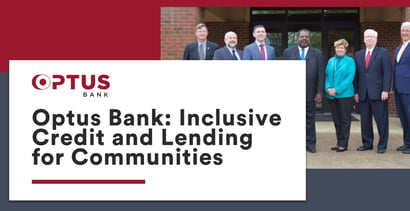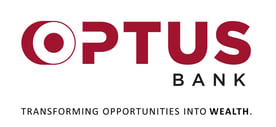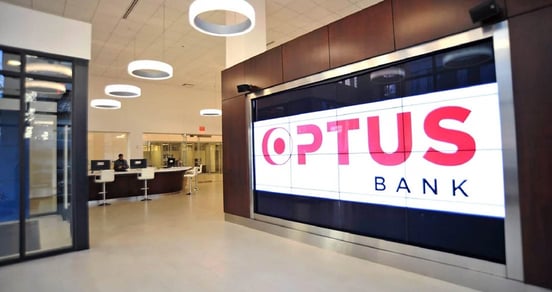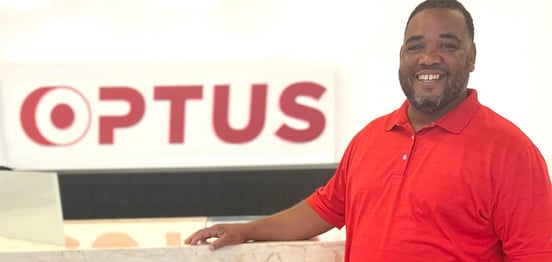

In a Nutshell: Optus Bank is on a mission to ensure equal financial access and opportunity for everyone — regardless of race or economic status. One of the bank’s founding principles is its focus on relationship banking which ensures that the institution understands the needs and desires of its account holders. That allows Optus Bank to provide the best possible financial products and services. Those financial products are part of its mission to close the racial wealth gap, and Optus also keeps its eye on a systemic goal: building a more equitable economy for all Americans.
Just because someone has money doesn’t mean that they know how to use it to maximize their financial well being. Many people, regardless of wealth, don’t have the knowledge or skills necessary to manage their finances.
That was the situation one former athlete found himself in. He obtained multiple financial products, including home and auto loans, to maintain his standard of living. However, he wanted to improve his capacity to eliminate debt and increase his wealth.

So he reached out to Optus Bank for help. Optus Bank didn’t try to convert him or sell him a product; instead, President and CEO Dominik Mjartan gave him a free assessment and advice, just as he does for anyone who reaches out with similar needs. That commitment to helping everyone is emblematic of how Optus Bank approaches its mission as a financial institution.
Optus is one of the few black-owned banks in the United States. It was founded in 1921 by a group of African-American men and women who were excluded from the financial system.
“They created an institution that did well for decades. It was critical in the Civil Rights era while channeling capital and supporting businesses when they were truly disadvantaged in an overt and explicit way,” Mjartan said.
Now, a century after its founding, the Optus Bank mission continues. And it still strives to promote equal access to financial services and opportunities — regardless of race or socioeconomic status.
“The big thing that separates Optus Bank from the traditional approach is that we’re trying to bank everyone, regardless of background or privilege,” Mjartan said. “Just like Dr. King said, the concept of making sure civil rights are aligned with ‘silver rights’ efforts is critical to our goal of what America stands for. We’re trying to play a part in the financial ecosystem where we channel services to businesses and homes that may not fit the traditional banking system.”
Core Banking Principles Balance Mission and Margin
While it emphasizes catering to underserved people, businesses, and communities, Optus Bank is open to everyone.
“We have customers with significant resources, but we also have customers with $4 in their account,” Mjartan said. “The challenge is to make sure we can build a viable banking institution that is growing and generating enough margin to support the mission. With no margin, there’s no mission.”
Optus Bank ensures it maintains its margin by creating diversified funding streams. That has also kept the COVID-19 pandemic from having a disproportionately negative impact on the bank and its customers.

Optus Bank has built a diversified customer base to help it reach more communities and businesses.
“In the previous recession, the majority of our assets were invested in underserved communities that were negatively impacted,” Mjartan said. “We were facing the same onslaught of disparities (we are) today where a lot of our customers are African American and women-owned businesses and located frequently in the most negatively impacted industries or geographies.”
In the aftermath of that recession, Optus Bank’s chairman rebuilt the institution around its core principles and started building the diversified customer base it has today. That approach allows its mission to advance, and Optus Bank now provides more capital and support to underserved businesses than at any other time in its history.
“Of course, we’re facing all kinds of challenges, but many mission-driven banks have historically struggled,” Mjartan said. “Our model seems to be working.”
Relationship Banking Goes Above and Beyond Credit
Many banks base their funding decisions on the five Cs of credit. They are:
- Character: the applicant’s credit history
- Capacity: the applicant’s ability to repay debt based on income
- Capital: the amount of money the applicant currently holds
- Collateral: the customer’s assets that can be used to back or secure the loan
- Cashflow: the ability to make loan payments
Optus Bank adds a sixth C: compassion.
“That’s what our team spends a significant amount of time on,” Mjartan said. “But if you look at our credit quality, especially the last three or four years in what I call the new era, we’ve charged off less than $30,000 on an almost $100 million portfolio. Mission and margin can coexist, and good credit quality and mission-driven lending are not mutually exclusive.”

Many small business owners turn to Optus Bank to help grow their operations.
That approach has its roots in Optus Bank’s commitment to building relationships. The bank fosters brand loyalty and improves its capacity to serve by understanding what those customers need and strengthening ties.
“What we go after is the needs assessment,” Mjartan said. “We want to understand the customer’s needs and to get to know them.”
Many Optus Bank customers don’t just need an app and a debit card. They also need someone to explain how they work, how to avoid overdraft fees, and how to access better credit.
“They can build a relationship with Optus Bank for when they do need a line of credit for their business or church or home,” Mjartan said.
Focusing Financial Education Where People Need It
Financial education is the key to managing money, building wealth, and achieving independence and stability. Holding on to assets and capital is a good thing, but it can turn bad if someone doesn’t know how to handle them.
However, information and educational resources alone aren’t enough. Effective teaching depends on two crucial factors: relevance and access.

Dominik Mjartan, Optus Bank President and CEO
“If you put someone through a class and then you don’t offer them a product, you just frustrated them,” Mjartan said. “Also, if you offer them financial education in a classroom setting or even a one-on-one setting, but they were not in a position to absorb it or utilize it to improve their life, it can be pointless.”
That philosophy illustrates why Optus Bank focuses on people. While the bank serves its customers, it also helps those on the other side of the interactions — its own employees. Optus Bank ensures that consumers can connect with someone at the bank and get the service they need.
“When a person physically or virtually leaves a branch or a facility, whether it’s by Zoom or in person, they need to be better off than when they walked in,” Mjartan said. “The way we ensure that is not just by offering them a product. We offer them a service, which is spending a lot of time walking them through their financial condition.”
Working for Financial Justice and a Stronger Economy
Optus Bank’s ultimate goal is to help close the racial wealth gap in America. That also feeds into a larger, more systemic mission: to create a stronger economy for everyone, regardless of ethnicity.
“If you look at studies about purchasing power, if you were to close the racial wealth gap, it would unleash, some studies have shown, as much as 1% to 2% over GDP growth annually, which translates into trillions of dollars of wealth for everyone,” Mjartan said. “The top quartile of the socioeconomic spectrum benefits greatly by closing the gap because they have so many more customers. Our whole model is based on closing the gap through entrepreneurship, homeownership, and asset accumulation.”
Optus Bank also focuses on assisting minority women-owned businesses disproportionately impacted by the COVID-19 pandemic. It is committed to helping them weather these difficult times and ensuring they come back stronger than ever before.
The same is true of homeowners. Mjartan said that in the previous recession, African Americans who didn’t own homes fared better than those who did. Homeowners were put in harm’s way to boost the bottom lines of big banks, which ended in financial devastation for many.
“We’re making sure our home loans, whether they’re in-house or on the secondary market, are done with truly understanding the condition of the borrower,” Mjartan said. “We’re not just trying to close the deal, but are also improving their lives. And that’s a different standard.”
Advertiser Disclosure
BadCredit.org is a free online resource that offers valuable content and comparison services to users. To keep this resource 100% free for users, we receive advertising compensation from the financial products listed on this page. Along with key review factors, this compensation may impact how and where products appear on the page (including, for example, the order in which they appear). BadCredit.org does not include listings for all financial products.
Our Editorial Review Policy
Our site is committed to publishing independent, accurate content guided by strict editorial guidelines. Before articles and reviews are published on our site, they undergo a thorough review process performed by a team of independent editors and subject-matter experts to ensure the content’s accuracy, timeliness, and impartiality. Our editorial team is separate and independent of our site’s advertisers, and the opinions they express on our site are their own. To read more about our team members and their editorial backgrounds, please visit our site’s About page.




